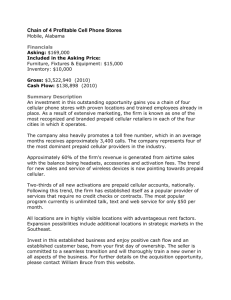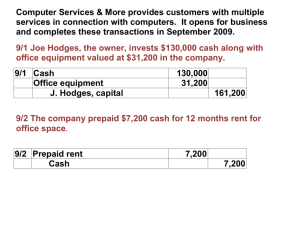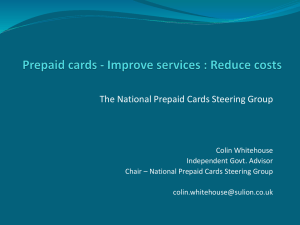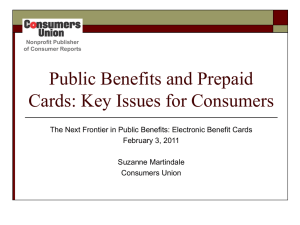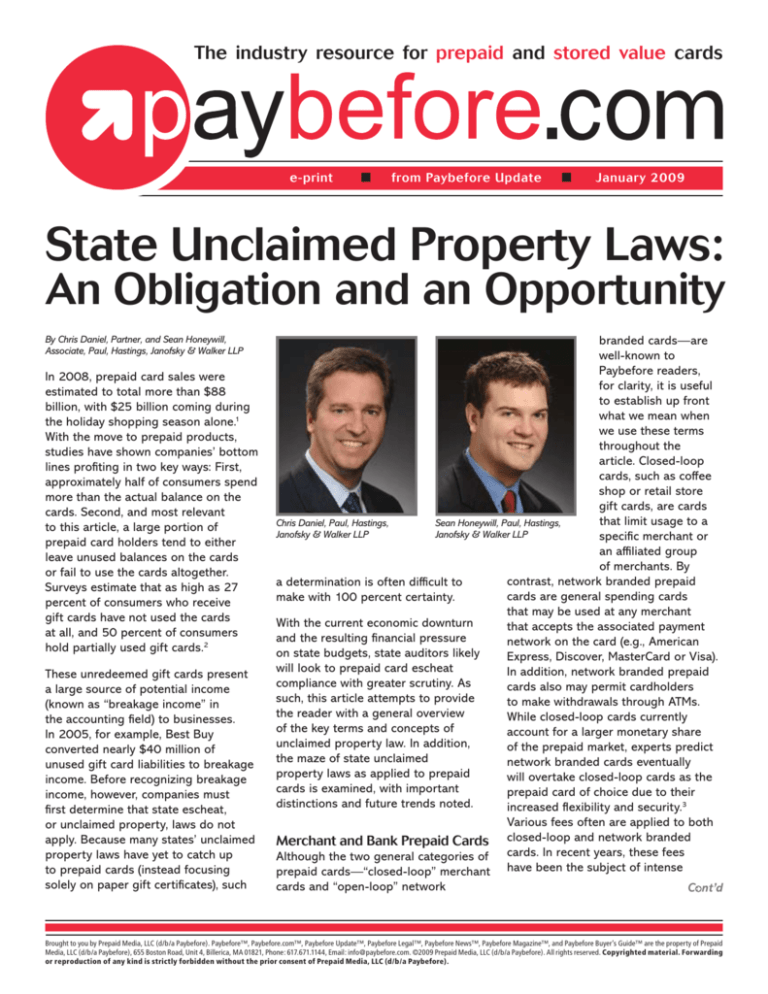
The industry resource for prepaid and stored value cards
e-print
from Paybefore Update
January 2009
State Unclaimed Property Laws:
An Obligation and an Opportunity
By Chris Daniel, Partner, and Sean Honeywill,
Associate, Paul, Hastings, Janofsky & Walker LLP
In 2008, prepaid card sales were
estimated to total more than $88
billion, with $25 billion coming during
the holiday shopping season alone.1
With the move to prepaid products,
studies have shown companies’ bottom
lines profiting in two key ways: First,
approximately half of consumers spend
more than the actual balance on the
cards. Second, and most relevant
to this article, a large portion of
prepaid card holders tend to either
leave unused balances on the cards
or fail to use the cards altogether.
Surveys estimate that as high as 27
percent of consumers who receive
gift cards have not used the cards
at all, and 50 percent of consumers
hold partially used gift cards.2
These unredeemed gift cards present
a large source of potential income
(known as “breakage income” in
the accounting field) to businesses.
In 2005, for example, Best Buy
converted nearly $40 million of
unused gift card liabilities to breakage
income. Before recognizing breakage
income, however, companies must
first determine that state escheat,
or unclaimed property, laws do not
apply. Because many states’ unclaimed
property laws have yet to catch up
to prepaid cards (instead focusing
solely on paper gift certificates), such
branded cards—are
well-known to
Paybefore readers,
for clarity, it is useful
to establish up front
what we mean when
we use these terms
throughout the
article. Closed-loop
cards, such as coffee
shop or retail store
gift cards, are cards
that limit usage to a
Chris Daniel, Paul, Hastings,
Sean Honeywill, Paul, Hastings,
Janofsky & Walker LLP
Janofsky & Walker LLP
specific merchant or
an affiliated group
of merchants. By
contrast, network branded prepaid
a determination is often difficult to
cards are general spending cards
make with 100 percent certainty.
that may be used at any merchant
With the current economic downturn
that accepts the associated payment
and the resulting financial pressure
network on the card (e.g., American
on state budgets, state auditors likely
Express, Discover, MasterCard or Visa).
will look to prepaid card escheat
In addition, network branded prepaid
compliance with greater scrutiny. As
cards also may permit cardholders
such, this article attempts to provide
to make withdrawals through ATMs.
the reader with a general overview
While closed-loop cards currently
of the key terms and concepts of
account for a larger monetary share
unclaimed property law. In addition,
of the prepaid market, experts predict
the maze of state unclaimed
network branded cards eventually
property laws as applied to prepaid
will overtake closed-loop cards as the
cards is examined, with important
prepaid card of choice due to their
distinctions and future trends noted.
increased flexibility and security.3
Various fees often are applied to both
Merchant and Bank Prepaid Cards closed-loop and network branded
Although the two general categories of cards. In recent years, these fees
prepaid cards—“closed-loop” merchant have been the subject of intense
cards and “open-loop” network
C nt’d
Brought to you by Prepaid Media, LLC (d/b/a Paybefore). Paybefore™, Paybefore.com™, Paybefore Update™, Paybefore Legal™, Paybefore News™, Paybefore Magazine™, and Paybefore Buyer’s Guide™ are the property of Prepaid
Media, LLC (d/b/a Paybefore), 655 Boston Road, Unit 4, Billerica, MA 01821, Phone: 617.671.1144, Email: info@paybefore.com. ©2009 Prepaid Media, LLC (d/b/a Paybefore). All rights reserved. Copyrighted material. Forwarding
or reproduction of any kind is strictly forbidden without the prior consent of Prepaid Media, LLC (d/b/a Paybefore).
State Unclaimed Property Laws: An Obligation and an Opportunity
Page 2
By Chris Daniel, Partner, and Sean Honeywill, Associate, Paul, Hastings, Janofsky & Walker LLP
consumer complaints and, in turn,
legislative activity affecting both card
categories. As discussed below, this
legislation has changed the unclaimed
property compliance landscape.
Escheat: Terminology
and Concepts
laws, the majority modeled on one or a
combination of the Uniform Unclaimed
Property Acts of 1954, 1966, 1981
and 1995 (the “Uniform Acts”).4
An understanding of unclaimed
property law begins with
two important terms:
All 50 states and the District of
Columbia have unclaimed property
Owner. A person or entity
who has a legal or equitable
interest in statutorily defined
unclaimed property. For ease of
administration, this term includes
an apparent owner and, as such, a
holder of unclaimed property need
not ascertain whether an owner’s
interest has passed to another.
Holder. Any person or entity
obligated to hold for the account
C nt’d
33 U.S. Jurisdictions Exempt Network Branded and/or Closed-Loop Prepaid Cards from Escheat
Jurisdiction
Alabama
Condition(s)
Only cards issued by retailers that sell
tangible property are exempt.
Jurisdiction
New Hampshire
Arizona
New Jersey
Arkansas
North Carolina
California
Merchant cards escheat if they have expiration dates.
North Dakota
Colorado
Cards redeemable for cash are not exempt.
Ohio
Connecticut
Condition(s)
Cards with values of $100 or less are exempt.
Cards with expiration dates are subject to escheat.
Oklahoma
Delaware
Restaurant cards with values of $5 or less are exempt.
Oregon
Florida
Bank cards are subject to escheat.
Pennsylvania
Idaho
Cards without expiration dates escheat.
Rhode Island
Illinois
Merchant cards escheat if they have
expiration dates or fees.
South Carolina
Bank cards are subject to escheat. Merchant cards
with expiration dates or post-sale fees escheat.
Indiana
Tennessee
Merchant cards escheat if have expiration dates or
fees. The escheat treatment of bank cards is unclear.
Kansas
Utah
Cards with values of $25 or less are exempt.
Kentucky
Vermont
Maryland
Virginia
Massachusetts
Wisconsin
Minnesota
Wyoming
Nebraska
Cards with values of $100 or less are exempt.
Bank cards are subject to escheat. Merchant cards
escheat if they have expiration dates or fees.
Brought to you by Prepaid Media, LLC (d/b/a Paybefore). Paybefore™, Paybefore.com™, Paybefore Update™, Paybefore Legal™, Paybefore News™, Paybefore Magazine™, and Paybefore Buyer’s Guide™ are the property of Prepaid
Media, LLC (d/b/a Paybefore), 655 Boston Road, Unit 4, Billerica, MA 01821, Phone: 617.671.1144, Email: info@paybefore.com. ©2009 Prepaid Media, LLC (d/b/a Paybefore). All rights reserved. Copyrighted material. Forwarding
or reproduction of any kind is strictly forbidden without the prior consent of Prepaid Media, LLC (d/b/a Paybefore).
State Unclaimed Property Laws: An Obligation and an Opportunity
Page 3
By Chris Daniel, Partner, and Sean Honeywill, Associate, Paul, Hastings, Janofsky & Walker LLP
of, or deliver or pay to, the
owner of the property that is
subject to the laws of escheat.
In general, escheat laws require
financial institutions and businesses
(i.e., holders) in possession of
abandoned or unclaimed intangible
property to report and remit to the
state such property after a specified
number of years of owner inactivity,
referred to as the dormancy period.
Unclaimed property laws are
custodial in nature. This means states
do not take title to the property
turned over by holders but hold the
property for the owner to claim.
Once unclaimed property is remitted
to a state, however, the state often
will convert unclaimed property, such
as stocks, to cash, with any resulting
future interest income considered the
property of the state. This interest
income often is critical to state
budgets, explaining the increased
scrutiny on escheat compliance
in poor economic environments.
It should be noted, however, that
states failing to follow escheat law
notification requirements (states
generally are required to publish
notice of receipt of any unclaimed
property) can be held liable to owners.
In 2007, for example, California
was barred temporarily by a federal
appeals court from accepting new
unclaimed assets until a new owner
notification system was established.5
Holders have both yearly unclaimed
property reporting and remittance
obligations. The reporting obligation
generally entails compiling a list
of the following information: (1) a
description of the property whose
dormancy period has expired; (2)
for property valued at $50 or more,
the name, last known address and
Social Security number of the owner
(if known); and (3) an aggregated
amount of items valued under $50
each.6 In addition, most states require
that the holder provide written
notice to the owner, if known, before
remitting unclaimed property valued
at more than $50 to the state. Upon
proper remittance of the unclaimed
property to the state, the holder is
released from liability to the owner.
Failure to follow the above procedures
can be costly. States may impose
substantial late reporting penalties and
assess interest as high as 12 percent
on undelivered unclaimed property.
Moreover, states have brought
litigation against companies in recent
years seeking to examine records for
escheat compliance audit purposes. In
2006, for example, Iowa brought suit
against Young America Corporation
to compel the company to provide
records relating to its consumer rebate
programs, specifically, uncashed
rebate checks. (Young America
provides consumer rebate fulfillment
services to numerous companies.)7
More than 43 states have signed
onto the suit, which was still ongoing
as of December 2008, and several
clients of Young America, including
Sprint, T-Mobile and Walgreens, have
been joined as defendants. As this
example suggests, proper compliance
should be a pressing issue for any
company looking not only to avoid
costly litigation but also the negative
publicity associated with it.
Unclaimed Property
Priority Rules
Priority rules established by the
United States Supreme Court in Texas
v. New Jersey8 determine to which
state unclaimed property escheats:
Primary Rule. The property
escheats to the state of the
owner’s last known address, as
shown by the holder’s records.
Secondary Rule. If the
owner’s last known address
is unknown or the owner’s
address is in a state that does
not provide for escheat of such
property, the property escheats
to the state of the holder’s
domicile (i.e., incorporation).
Statutory Escheat. If neither the
primary nor secondary rule applies,
the 1981 and 1995 Uniform
Acts (and all the states that have
adopted such acts) provide that
the unclaimed property escheats to
the state in which the transaction
occurred. Such legislation is
of questionable constitutional
authority, as the Supreme Court
rejected a transactional rule
in Pennsylvania v. New York.9
However, because the issue in
Pennsylvania was whether a
transactional rule should be able to
override the primary and secondary
rules—not whether a transactional
rule should be adopted as a third
C nt’d
Brought to you by Prepaid Media, LLC (d/b/a Paybefore). Paybefore™, Paybefore.com™, Paybefore Update™, Paybefore Legal™, Paybefore News™, Paybefore Magazine™, and Paybefore Buyer’s Guide™ are the property of Prepaid
Media, LLC (d/b/a Paybefore), 655 Boston Road, Unit 4, Billerica, MA 01821, Phone: 617.671.1144, Email: info@paybefore.com. ©2009 Prepaid Media, LLC (d/b/a Paybefore). All rights reserved. Copyrighted material. Forwarding
or reproduction of any kind is strictly forbidden without the prior consent of Prepaid Media, LLC (d/b/a Paybefore).
State Unclaimed Property Laws: An Obligation and an Opportunity
Page 4
By Chris Daniel, Partner, and Sean Honeywill, Associate, Paul, Hastings, Janofsky & Walker LLP
fallback option—the possibility
exists that such legislation could
be upheld on challenge.10
State Escheat Treatment
of Prepaid Cards
The escheat landscape applicable to
prepaid cards presents significant
legal risks to companies, as no uniform
approach has developed among the
states.Alternatives that states have
taken with prepaid cards include:
Interpreting unclaimed property
statutes that do not reference
prepaid cards to nonetheless
include prepaid cards;
Expressly including or
exempting prepaid cards from
unclaimed property laws;
Expressly including or exempting
prepaid cards from the definition
of “gift certificate” as used in
unclaimed property statutes.11
Because nearly every state’s escheat
statute addresses the treatment of gift
certificates, a business can determine
by analogy in those states that make
no reference to prepaid cards, or
directly in those states that include
prepaid cards within the definition
of “gift certificate,” what the likely
escheat consequences will be.
As of December 2008, 33 U.S.
jurisdictions exempt prepaid cards
(closed-loop, network branded or
both) from escheat. (See the table
on page 6.) In certain states, such as
Nebraska, network branded prepaid
cards are subject to escheat; closedloop merchant cards with no fees or
expiration dates are not. Even in the
jurisdictions where prepaid cards
are subject to escheat, the dormancy
periods that trigger remittance vary,
as do the dollar amounts that must
be remitted. For example, while Texas
requires 100 percent of a card’s
balance remitted after three years of
dormancy, Missouri requires remittance
of only 60 percent of the dormant
card’s balance after five years. This
means in states such as Missouri,
businesses are able to profit from
unused gift cards to some extent.
Pushed by consumer complaints,
states also have passed legislation
regulating gift card expiration dates
and fees.12 These laws impact prepaid
card escheat treatment in several
states. In North Carolina, for example,
closed-loop cards with expiration dates
are subject to escheat, while closedloop cards with no expiration date are
exempt. Another slowly developing
push among the states is legislation
requiring companies to cash out
prepaid cards when balances fall below
a certain threshold, such as $10.
Concluding Advice
No uniform approach has developed
regarding the escheat treatment
of prepaid cards. Moreover, state
regulation in this area is becoming
more aggressive, often relying on
private audit firms to find errors
(e.g., the Young America case). Smart
companies must develop compliance
policies and reporting procedures that
conform to the laws of the states in
which they operate. Failure to do so
can result in costly penalties, possible
litigation and reputational risk.
Chris Daniel is chair of the Payment Systems
Group at Paul, Hastings, Janofsky & Walker
LLP, an international law firm, and Sean
Honeywill is an associate in the Tax Group
at Paul Hastings. Daniel may be reached at
chrisdaniel@paulhastings.com, and Honeywill may
be reached at seanhoneywill@paulhastings.com.
ENDNOTES:
1 See Press Release, TowerGroup, TowerGroup’s Hard Candy Christmas: Gift Card Sales
to Drop Amid Falling Retail Sales; Banks take Lighter Hit (Nov. 18, 2008).
6 The dollar thresholds that trigger the more detailed section of the report
vary by state, with some as low as $25 and others as high as $100.
2 See, e.g., Alan Rappeport, Re-Gifting: Unused Gift Cards Can
Boost Company Income, CFO.COM, (Nov. 21, 2007).
7 See Fitzgerald v. Young America Corporation, Civ. Action No. 6030 (Iowa Dist. Ct. Feb. 8, 2006).
3 See John Douglas, Chris Daniel & Helen Lee, New General Counsel’s Opinion No.
8 – The FDIC Provides Clarity on Deposit Insurance and Assessments on Funds
Underlying Stored Value Cards, PAUL HASTINGS STAY CURRENT (November 2008).
4 The Uniform Disposition of Unclaimed Property Act was the official name of the 1954 and 1966 Acts.
5 See Taylor v. Chiang, No. Civ. S-01-2407 WBS GGH, (E.D. Cal. June 1, 2007). The ban was
subsequently lifted late in 2007. However, another federal court held that California
must begin paying interest to owners whose property was held in custody by the state.
See Suever v. Connell, No. C 03-00156 RS (N.D. Cal. Oct. 12, 2007). While not binding on
other states, these holdings may begin a wave of challenges of other states’ notification
and interest payment procedures for unclaimed property held in custody.
8 379 U.S. 674 (1965). In Western Union Telegraph Company v. Pennsylvania,
the Supreme Court held that due process prevented two states from
escheating the same item of property. 368 U.S. 71 (1961).
9 407 U.S. 206 (1972).
10Of course, these priority rules present an opportunity for escheat/tax planning. To explain, if
a “holder” were to sell anonymous prepaid cards where the identity of the “owner” was not
known and the holder’s state of incorporation had favorable escheat laws, then the holder
may be able to retain the breakage as revenue rather than remitting the same to the state.
11Phillip W. Bohl et al., Prepaid Cards and State Unclaimed
Property Laws, 27 FRANCHISE L.J. 23, 26 (2007).
12A fair number of states exempt open-loop cards from such expiration and fee regulation.
Brought to you by Prepaid Media, LLC (d/b/a Paybefore). Paybefore™, Paybefore.com™, Paybefore Update™, Paybefore Legal™, Paybefore News™, Paybefore Magazine™, and Paybefore Buyer’s Guide™ are the property of Prepaid
Media, LLC (d/b/a Paybefore), 655 Boston Road, Unit 4, Billerica, MA 01821, Phone: 617.671.1144, Email: info@paybefore.com. ©2009 Prepaid Media, LLC (d/b/a Paybefore). All rights reserved. Copyrighted material. Forwarding
or reproduction of any kind is strictly forbidden without the prior consent of Prepaid Media, LLC (d/b/a Paybefore).



